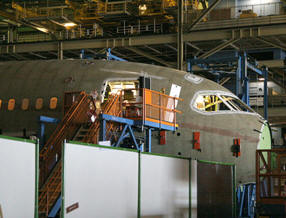|
|||||||||||||||||
|
|
|
|||
|
The U.S. Government’s Case Against Boeing |
||||
 |
April 28, 2011 - “I can’t not issue a complaint in the
face of such evidence.” That was the reaction from
National Labor Relations Board (NLRB) Acting General
Counsel Lafe Solomon, when asked about his decision to
issue a complaint against the Boeing Company.
Few NLRB complaints have generated as much publicity.
Hundreds of media outlets reported on the announcement,
ranging from workers’ rights advocates who welcomed the
news, to conservative politicians who issued
spittle-flecked condemnations. Among the most misleading statements that followed the complaint was an erroneous claim, repeated ad nauseam in the conservative blogosphere, that unions were seeking the ability to veto where a company locates and conducts business. |
|||
|
A similar canard came from Boeing’s Executive Vice President and
General Counsel J. Michael Luttig, who declared, “This claim is
legally frivolous and represents a radical departure from both
NLRB and Supreme Court precedent.”
Additionally, Boeing complained about how long the Board took to
complete its investigation, while omitting mention of their own
campaign to prolong the investigation with multiple requests
designed to delay any complaint by the NLRB.
“The NLRB investigated and found clear violations of federal
labor law,” said IAM Vice President Rich Michalski. “The next
question is, what remedy is appropriate? What we want is for the
government to enforce the rule of law. We want an effective
remedy that will tell our members in Puget Sound that Boeing
cannot get away with retaliatory behavior.”
On April 20, 2011, the Acting General Counsel of the National
Labor Relations Board issued a complaint against the Boeing
Company alleging that it violated federal labor law by deciding
to transfer a second airplane production line from a union
facility in the state of Washington to a non-union facility in
South Carolina for discriminatory reasons. A hearing has been
set for June 14, 2011 in Seattle before an administrative law
judge. |
||||
|
On March 26, 2010, the International Association of Machinists and
Aerospace Workers, District Lodge 751, filed a charge with the NLRB
alleging that the Boeing Company had engaged in multiple unfair labor
practices related to its decision to place a second production line for
the 787 Dreamliner airplane in a non-union facility.
Specifically, the union charged that the decision to transfer the line
was made to retaliate against union employees for participating in past
strikes and to chill future strike activity, which is protected under
the National Labor Relations Act.
Throughout the investigation of the charge, NLRB officials met with both
parties in efforts to facilitate a settlement agreement. The
overwhelming majority of NLRB charges found to have merit are settled by
agreement. Although no settlement was reached and the Agency was
compelled to pursue litigation, the Acting General Counsel remains open
to a resolution between the parties.
The complaint issued by the Acting General Counsel (19-CA-32431) alleges
that Boeing violated two sections of the National Labor Relations Act by
making coercive statements and threats to employees for engaging in
statutorily protected activities, and by deciding to place the second
line at a non-union facility, and establish a parts supply program
nearby, in retaliation for past strike activity and to chill future
strike activity by its union employees.
The investigation found that Boeing officials communicated the unlawful
motivation in multiple statements to employees and the media. For
example, a senior Boeing official said in a videotaped interview with
the Seattle Times newspaper: "The overriding factor (in transferring the
line) was not the business climate. And it was not the wages we’re
paying today. It was that we cannot afford to have a work stoppage, you
know, every three years." |
|
|
| ©AvStop
Online Magazine
Contact
Us
Return To News
|
|

